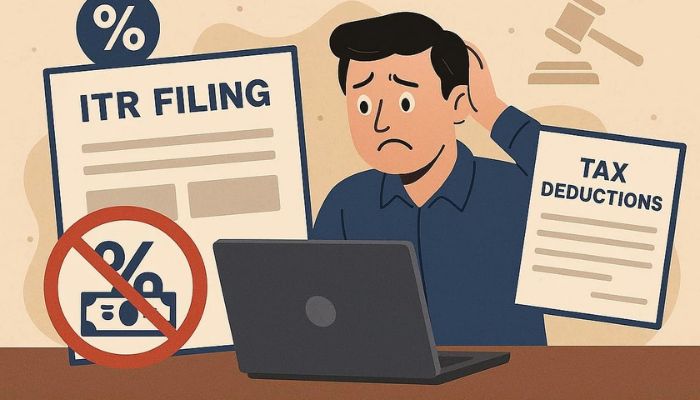When I started working as a self-employed person, I worried about health insurance costs. After learning about the self-employed health insurance deduction, I realized I could save money on taxes.
The self-employed health insurance deduction lets you subtract your health insurance costs from your income when doing taxes. It helps self-employed people save money on taxes by making health coverage cheaper.
In this article, you’ll learn how self-employed people can save money on taxes with a simple health insurance deduction.
Table of Contents
- What does the health insurance deduct for self-employed individuals mean?
- How much am I able to take deductions under this program?
- What do I do to get this tax deduction claimed on my return?
- What effect does this deduction have on my tax return overall?
- Do I qualify for this deduction even if I’m not making money?
- Are long-term care and dental cost also deductible?
- Does this deduction impact me in my tax on self-employment?
- Can I deduct the cost of premiums that I have that I have paid in advance?
- What are the most common mistakes to avoid when you claim this deduction?
- What documentation should I save to prove my deduction?
- Is it possible to be eligible for this deduction if work in another place?
- Mostly Asked Question:
- In The End:
What does the health insurance deduct for self-employed individuals mean?
Self-employed health insurance deduction permits you to reduce the health insurance premiums to yourself and your partner and your dependents, from your income gross when you file taxes. This deduction is designed specifically for self-employed persons including solo proprietors and independent contractors or members of LLCs that are taxed as sole owners or partnerships.
This deduction helps lower your tax-deductible income, meaning you pay less taxes all-around. The reason for the deductions is to reduce the cost of health insurance for those who are self-employed and do not be able to access employer-sponsored plans.
How much am I able to take deductions under this program?
The amount you are able to deduct is contingent upon the actual premiums for health insurance that you pay during the year, as well as your self-employment net profits. You can deduct the full amount you paid for dental, health and long-term health insurance.
if they were paid from your earnings from business. The deduction must not exceed the net profit you earn from self-employment. For instance, you could only deduct $10,000 if your company’s profit was $10,000 and you paid $12,000 for the premium.
What do I do to get this tax deduction claimed on my return?

The tax deduction for self-employed workers requires just a few steps. In the beginning, you must keep meticulous documents of all health insurance premiums that you have paid throughout the course of the year. When you’re ready to complete your tax returns You’ll need to fill out Form 1.
On Schedule 1 Locate line 16, “Self-employed health insurance deduction,” and then enter the total amount of premiums you actually paid. Your income’s gross amount will decrease as a result. Your total tax bill will go down as a result.
What effect does this deduction have on my tax return overall?
- Reduces Your Taxable Income: This deduction helps lower the total amount of income that is taxed, which means you pay less in taxes overall.
- May Move You to a Lower Tax Bracket: Lowering your income through deductions could put you into a less expensive tax bracket, saving you more money.
- Increases Your Refund or Reduces What You Owe: Claiming this deduction can lead to a bigger tax refund or decrease the amount you need to pay when you file.
- Acts Like a Tax Discount: It’s like getting a discount on your taxes because it subtracts your health insurance costs from your income.
- The More You Pay, The Bigger the Benefit: If you pay more for health insurance, the deduction helps you save more money on taxes.
- Applies Mainly to Federal Taxes: This deduction affects your federal income taxes, but some states might also allow similar deductions.
- Keep Records and Receipts: To claim this deduction, you should keep proof of your health insurance payments, like receipts and statements.
Do I qualify for this deduction even if I’m not making money?
You cannot take advantage of the health insurance deduction for self-employed workers in the event that your business failed to earn a net profit over the entire year.The IRS caps this deduction at the whole of your self-employment net profits.
If your company is able to show losses or a zero-profit it is not possible to benefit from this deduction since it’s intended to offset the loss from your business. However, if you did make an earlier profit during the year.
Are long-term care and dental cost also deductible?
The deduction for self-employed health insurance usually includes dental insurance as well as long-term health insurance premiums. Dental and long-term care charges are tax deductible because the IRS considers these types of coverage to be eligible health insurance costs.
This is beneficial since long-term care and dental expenses can be substantial and are not always covered under standard health insurance plans. By incorporating these costs will allow you to maximize your deductible and reduce the amount of tax deductible.
Does this deduction impact me in my tax on self-employment?

The tax deduction for self-employed workers will not directly lower your tax on self-employment. It’s a modification on your income on your tax return which reduces your tax-deductible income and, as a result, your tax obligation on income.
Self-employment tax is separately calculated in the Schedule SE and is calculated based on the amount you earn through self-employment. Because that the deduction for health insurance doesn’t affect your net earnings to be used for tax purposes on self-employment.
Can I deduct the cost of premiums that I have that I have paid in advance?
Yes, you are able to deduct the cost of premiums in advance for health insurance coverage that continues to the following year in the event that you have the right to the insurance during the tax year you’re currently in.
In accordance with IRS regulations, premiums paid for coverage that starts in the year ahead can be deducted from the year that they are paid if you’re an individual taxpayer on a cash basis, as most people are.
What are the most common mistakes to avoid when you claim this deduction?
Not Keeping Good Records:
One of the most common mistakes is not keeping enough proof of your health insurance payments. When you claim the deduction, the IRS may ask for receipts, bank statements, or insurance bills. If you don’t have these, your claim could be denied.
Claiming the Wrong Amount:
Another common mistake is claiming more than what you actually paid. Sometimes people forget how much they paid or accidentally include expenses that don’t qualify. Only include the amount you paid for health insurance premiums out of your own pocket.
Forgetting to File the Right Forms:
Filing the wrong tax form or forgetting to include the deduction can cause issues. You need to use the correct form or schedule (like Schedule A or Schedule 1) to claim your health insurance deduction. If you miss this step, you might not get the benefit you deserve.
Ignoring State Tax Rules:
While this guide focuses on federal taxes, some people forget that states may have their own rules about health insurance deductions. Some states do not allow this deduction, or they might have different requirements.
What documentation should I save to prove my deduction?
Keep meticulous and organized records is vital to prove the Self-employed Health Insurance deductions in the event the need arises for the need for an IRS audit. Keep the originals of your premium receipts, cancelled checks, bank statements that show the payment, as well as any bills or invoices from your insurance company.
It is also beneficial to keep a log of all policy information that include the start and end dates, the coverage type and amount of premium that you paid. If you pay your premiums through an insurance company, or through a marketplace or a broker, keep the official bills or statements.
Is it possible to be eligible for this deduction if work in another place?

Generally, no. If you are covered by the health insurance plan of your employer or your spouse’s work and you are eligible to enroll in that plan, then you are not eligible to benefit from the deduction for self-employed health insurance for premiums that you have paid through your job.
However, if you’re self-employed and do not join your employer’s health insurance plan or you do not qualify for coverage through your employer, you are able to take advantage of the deduction for premiums that you have paid for your personal insurance.
Mostly Asked Question:
Can I take advantage of this deduction if are a freelancer?
Absolutely. Self-employed freelancers are entitled to the health insurance deduction for self-employed in the event that they meet the eligibility requirements. Since freelancers aren’t able to get employers-sponsored health insurance and health insurance plans.
Can I take the premiums you pay to a health savings plan (HSA)?
Premiums incurred for a health savings plan (HSA) aren’t tax-deductible in the health insurance deduction for self-employed workers. HSAs are tax-exempt accounts that assist in paying for medical expenses.
How does switching health insurance mid-year affect me?
If you change health insurance plans in the year, you are able to typically deduct the premiums you paid for each plan in the time which you are covered. It’s essential to keep meticulous documents of the premiums paid for each plan as well as time periods for coverage.
How long should I track my health insurance costs?
The IRS suggests keeping records of your health insurance premiums as well as related documents for a minimum of three years after the day you complete the tax returns. If you’re subject to audit it is necessary to show evidence of your premiums and therefore keeping receipts, cancelled check, bank statements.
In The End:
In conclusion, claiming the health insurance deduction can save you money on your taxes, but it’s important to do it carefully. Make sure to keep good records, claim the correct amount, and use the right forms. Avoid common mistakes like over-claiming or forgetting to include the deduction on your tax return.





